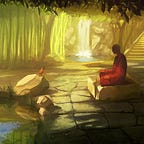The Source of All Suffering
In the quiet moments of our lives, when the hustle and bustle of daily existence fade into the background, we often find ourselves contemplating the deeper questions of life. Among these questions, one that stands out is the nature of suffering. Why do we suffer? What is the root cause of our pain and distress? To unravel this profound mystery, we must delve into the spiritual dimensions of our existence, for it is there that we find the answers.
At its core, suffering arises from a fundamental disconnect between our true nature and the way we perceive and interact with the world. This disconnect manifests as ignorance, attachment, and aversion — key elements that many spiritual traditions identify as the sources of our suffering.
Ignorance, in a spiritual sense, is not a lack of knowledge but a misunderstanding of the nature of reality. It is the mistaken belief that we are separate, isolated beings, cut off from the divine and from each other. This illusion of separateness creates a sense of vulnerability and fear. We begin to see ourselves as limited, finite entities struggling against the vastness of the universe. This misperception is the root of much of our suffering, as it fuels our desires and aversions.
The ancient wisdom of the Upanishads in Hinduism speaks to this ignorance, describing it as a veil that obscures our true self, or Atman, which is one with Brahman, the ultimate reality. When we fail to recognise our intrinsic connection to the divine, we become entangled in the material world, seeking fulfilment in transient things and experiences. This quest for external validation and pleasure only leads to more suffering, as the external world is ever-changing and impermanent.
Attachment is the natural consequence of ignorance. When we identify with the ego, we cling to people, possessions, and experiences, believing they are essential for our happiness. This clinging creates a cycle of desire and craving, as we constantly seek to acquire and hold on to that which we believe will bring us satisfaction. However, the transient nature of the material world means that these objects of desire are fleeting. As they slip through our grasp, we experience loss and disappointment, which only deepen our suffering.
The teachings of Buddhism offer profound insights into this aspect of suffering. The Second Noble Truth states that the cause of suffering is attachment, or “tanha.” This craving for sensory pleasures, existence, and non-existence binds us to the wheel of samsara, the cycle of birth, death, and rebirth. Liberation from this cycle, known as Nirvana, is achieved through the cessation of attachment and the realization of the impermanent nature of all things.
Just as attachment binds us to pleasure, aversion binds us to pain. We fear and resist experiences that we perceive as unpleasant or harmful, trying to push them away or avoid them altogether. This resistance creates a constant undercurrent of anxiety and fear, as we anticipate and react to the inevitable challenges and hardships of life. By focusing on what we wish to avoid, we give power to our fears and allow them to control us, leading to even greater suffering.
The Taoist philosophy offers wisdom on how to transcend aversion through the principle of wu wei, or effortless action. By accepting life’s ebb and flow without resistance, we learn to embrace both joy and sorrow with equanimity. This acceptance allows us to move through life with grace and serenity, reducing the impact of suffering.
The spiritual journey toward understanding and transcending suffering begins with self-awareness. By recognising the patterns of ignorance, attachment, and aversion within ourselves, we can start to dissolve them. Meditation, mindfulness, and contemplative practices are powerful tools on this journey. They help us cultivate inner peace, clarity, and a deeper connection to our true self.
Ultimately, the source of all suffering lies within our own minds and hearts. By turning inward and addressing the root causes of our pain, we can find a path to true liberation. This journey is not easy, but it is the most profound and transformative endeavour we can undertake. In the end, it leads us back to our true nature, where we find not only the end of suffering but also the boundless joy and peace that come from living in harmony with the divine essence of life.
